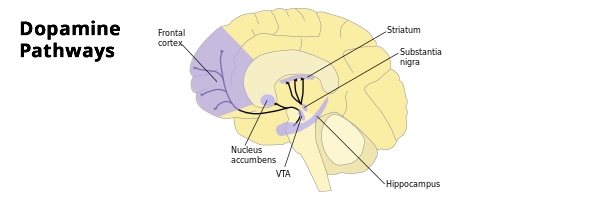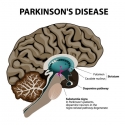Lou Gehrig's disease, also known as ALS (amyotrophic lateral sclerosis), is a fatal neurodegenerative disorder for which there is no official treatment. However, in 2009 researchers reported on a group of patients with ALS and how they responded to being treated with stem cells. The majority of them did unbelievably well. And now, another study is again showing promise with stem cells.
Neurological Disorders: Parkinson's Disease, ALS, Multiple Sclerosis
Parkinsons.jpg

Illustration by NIDA, Quasihuman / Public domain
Neurological disorders are diseases of the central and peripheral nervous system. These disorders include Alzheimer's disease and other dementias, multiple sclerosis, Amyotrophic lateral sclerosis (ALS), Parkinson's disease, cerebrovascular diseases including stroke, migraine and other headache disorders, epilepsy, neuroinfections, brain tumors, traumatic disorders of the nervous system due to head trauma, and neurological disorders as a result of malnutrition.
Woman Sees Peripheral Neuropathy Virtually Disappear After One 20-Minute Treatment
Peripheral neuropathy is a problem for many people. The good news is that this condition is now seeing the light – and responding. The light is monochromatic low-level near-infrared light. Here’s what we’re finding out about this groundbreaking treatment.
Parkinson’s Disease: Possible Mechanisms for Nutritional Approaches
Parkinson’s disease (PD) is among the most common chronic neurodegenerative conditions, affecting 1% of those over 60 years of age, and involves motor and non-motor impairments. Thus, better clinical outcomes may result when practitioners utilize nutritional and supplement interventions that support reductions in neuroinflammation and neurodegeneration as early as possible.
PEMF (Pulsed Electromagnetic Field) Devices in the Care and Management of Neurological Disorders
PEMF has been shown to support progress in neuro-chemical conditions that include addiction, ADHD, anxiety, autism spectrum disorders, depression, PTSD, and sleep issues. Research also indicates benefit for neuro-pathologies such as concussion, memory loss, mild cognitive impairment (MCI), mild traumatic brain injury (TBI), multiple sclerosis, Parkinson’s disease, stroke, and tremor.
A Potential Breakthrough in Alzheimer's Disease
Exciting research shows a possible new treatment for Alzheimer's, ALS, Parkinson's and other neurological disorders. BMAA is a neurotoxin produced by blue-green algae which inserts itself into the amino acid chain replacing L-serine. Scientists have found supplementing with L-serine blocks the insertion of BMAA, stops protein misfolding, and prevents neuronal damage. In cases of ALS it slowed the progression of the disease by 85%.
Metabolic Medicine: Poly-MVA
The outcome of a study done by Dr. James Forsythe showed that Poly-MVA is a safe (both orally/IV) and extremely effective supplement for support and palliative assistance in stage IV cancer patients, either with or without concomitant chemotherapy. The safety profile is excellent and there were no treatment related deaths or any significant adverse reactions or negative interactions with chemotherapy or hormonal treatments. The best responding tumors were: Prostate, Breast, Lung, Head/Neck, Colorectal, and Hematological. Results show an improved Overall Response Rate over historical controls. Other research has shown a benefit for neurological diseases such as Parkinson’s, Alzheimer’s and Huntington’s.
N-Acetyl Cysteine May Support Dopamine Neurons in Parkinson's Disease: Preliminary Clinical and Cell Line Data
The results of this preliminary study demonstrate for the first time a potential direct effect of NAC on the dopamine system in Parkinson's disease patients, and this observation may be associated with positive clinical effects.
How Cannabidiol (CBD) Can Impact Your Health
Confused about the healing effects of hemp and marijuana? Learn about the differences between the cannabinoids THC and CBD and how cannabidiol (CBD) can impact so many diseases and imbalances in the body.
Know the Enemy: Identifying Dementia with Advanced Medical Imaging
Physicians can use a SPECT scan to measure blood flow through the brain. The location of where blood flow is diminished will determine if it is simply dementia, Alzheimer's disease, Lewy Body Dementia, depression, or obsessive compulsive behavior.
Should You Try a Ketogenic Diet?
The goal of the ketogenic diet is to shift the body away from using glucose, the preferred energy source, and into ketosis, or fat-burning mode. This is accomplished by drastically increasing fat and reducing carbohydrate and protein intake.
Parkinson's Disease: What Works, What Doesn't
With the help of stem cells, hyperbaric oxygen, glutathione and life style changes, patients with Parkinson's can often slow disease progression, improve function, and enhance overall health.
Parkinson's Disease Study
This treatment has the potential to dramatically improve quality of life for patients suffering from the disease. As designed, this double blind, randomized trial will test the effectiveness of a picoTesla magnetic treatment versus a sham device on motor function for patients with Parkinson's disease. Research has been conducted at the Veteran's Administration Parkinson Research Center in the Philadelphia Veterans’ Administration Hospital Medical Center.













